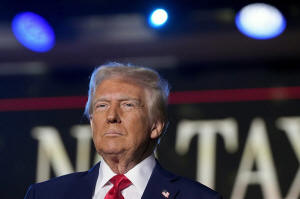Trump says inflation isn't his No. 1 issue. So what will happen to
consumer prices?
 Send a link to a friend
Send a link to a friend
 [January 27, 2025] By
CHRIS MEGERIAN and JOSH BOAK [January 27, 2025] By
CHRIS MEGERIAN and JOSH BOAK
WASHINGTON (AP) — Two months ago, in his first network television
interview after the election, Donald Trump said he owed his victory to
Americans' anger over immigration and inflation, specifically the rising
cost of groceries.
“When you buy apples, when you buy bacon, when you buy eggs, they would
double and triple the price over a short period of time,” he told NBC’s
“Meet the Press. “And I won an election based on that. We’re going to
bring those prices way down.”
But in Trump's first week back in the White House, there was little in
his initial blitz of executive orders that directly tackled those
prices, besides directing federal agencies to start “pursuing
appropriate actions.” He is taking steps to lower energy costs,
something that Trump hopes will have ripple effects throughout the
economy. Otherwise, his focus has been clamping down on immigration,
which he described as his “No. 1 issue” shortly after taking the oath of
office.
“They all said inflation was the No. 1 issue. I said, ‘I disagree,’”
Trump said. “I talked about inflation too, but how many times can you
say that an apple has doubled in cost?”
Trump is banking on voters giving him a pass and continuing to blame
former President Joe Biden for high prices. The Republican's comments
reflect the reality that presidents have almost no levers to reduce
inflation quickly without causing collateral damage to other parts of
the economy.

There is more that Trump can do on energy. He is pushing to reduce
regulations and increase the amount of land available for drilling. He
is trying to persuade domestic and foreign oil producers to potentially
sacrifice their own profits by pumping more.
During a rally Saturday in Las Vegas, Trump went after his Democratic
predecessor for allowing prices to rise under his watch, and promised to
take care of the problem quickly.
“When I think of Biden, I think of incompetence and inflation,” Trump
said.
Inflation peaked at a 9.1% annual rate in June 2022 during worldwide
supply chain problems after the economic shock of the coronavirus
pandemic. Overall consumer prices have fallen since then, but have
ticked up in recent months, from 2.4% in September to 2.9% in December,
the latest figures available. Economists have warned that Trump's plans
for tariffs and tax cuts could create new inflationary pressures and
keep interest rates elevated.
Vice President JD Vance, in an interview with CBS' “Face the Nation”
airing Sunday, defended the White House's work so far.
“Prices are going to come down, but it’s going to take a little bit of
time, right?” he said. He added, “Rome wasn't built in a day.”
Trump's relative shift away from addressing costs could create an
opening for Democrats to say he is not helping working-class voters,
hoping that argument could offer the party a path back to power in
Washington.
Sen. Chris Murphy, D-Conn., said Trump preferred to distract people from
inflation with talk of adding Greenland to the United States or seizing
the Panama Canal.
“It’s catnip and it causes everybody to stop paying attention to their
actual economic agenda, which has nothing to do with lowering costs and
everything to do with rigging the economy to help the Mar-a-Lago crowd,”
he said.
[to top of second column] |

President Donald Trump speaks about the economy during an event at
the Circa Resort and Casino in Las Vegas, Saturday, Jan. 25, 2025.
(AP Photo/Mark Schiefelbein)
 During an interview on Fox News this
past week, host Sean Hannity struggled to get Trump to focus on the
economy.
"Let me get to the economy,” Hannity said at one point. “I’m running
out of time.”
“The economy is going to do great,” Trump insisted.
When Trump did talk about inflation in the interview, he noted how
low it was during his first term and insisted prices would not have
jumped up if he had president after the 2020 election, even though
higher inflation was a global trend coming out of the pandemic.
It is not clear how Trump would persuade oil companies and foreign
countries to quickly increase production, possibly costing them
profits.
The Energy Information Administration reported that domestic oil
production has grown at an annual rate of roughly 8.4% over the past
two years to an average of nearly 13.5 million barrels a day in
October. Some Trump aides suggest that could increase by an
additional 3 million barrels a day.
It would be difficult to achieve that much additional production in
a single year without serious changes to the global market. The
International Energy Agency estimates that the oil supplied to the
entire world will increase by 1.8 million barrels per day to 104.7
million barrels a day. He also has expressed opposition to
climate-friendlier wind and solar energy, putting more pressure on
the U.S. economy to rely on fossil fuels.
EJ Antoni, a research fellow at the Heritage Foundation, a
conservative think tank in Washington, said the potential increase
in energy production under Trump would ultimately flow through the
economy in the form of lower prices.
“If you’re going to bring down the cost of energy, you’re going to
bring down the cost of all kinds of goods and services," he said.
But there is a risk that some of Trump's plans taken as a whole
could raise — not reduce — prices. Deporting migrants who are in the
United States illegally could deprive companies of lower wage
workers. The cost of tariffs, which are taxes placed on foreign
imports, could be passed on to consumers.

Trump said that his strategy also might ultimately involve publicly
pressuring the Federal Reserve to cut interest rates, saying in
Davos that he would “demand” lower rates from central banks. The Fed
sees its political independence as key for making tough choices to
stabilize prices. Biden saw the independence as worth protecting,
whereas Trump sees it as problematic.
The Fed raised its benchmark rates starting in 2022 to make it more
expensive to borrow and succeeded enough in reducing inflationary
pressures that it could trim rates late last year. Trump believes
that greater oil production will put him in a position to tell the
Fed what to do.
Asked in the Oval Office if he expects the Fed to listen to him,
Trump simply said, “Yeah.”
All contents © copyright 2025 Associated Press. All rights reserved |